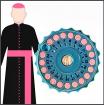Religious threats to Human Rights
For the threats posed to human rights specifically by concordats:
♦ Concerns about human rights.
For concerns about the Slovak concordat that the Vatican still hopes to finalise:
♦ Draft of the “conscience concordat” (2004).
As the Church of Englsnd delicately implies, human rights are a competing value system:
“The concept of human rights is not a straightforward one to integrate fully into Christian theology.”
— “Voice of the Church in public life”, Mission and Public Affairs Council,
Church in England, October 2008.
Melborne Catholic archbishop Denis Hart said he'd rather go to jail than report child abuse heard in confession: “Communication with God is of a higher order.”
When human rights conflict with Catholic doctrine, the Church tries to ensure that its own rules have precedence. Concordats can help accomplish this. Through concordats the Church attempts, wherever possible, to build its doctrines built into countries' constitutions and national law, even when this violates human rights. For example, the Constition of the Dominical Republic now effectively bans abortion, while concordats in both Brazil (art. 13) and Germany (art. 9) uphold Catholic confessional secrecy.
 It has been a continual struggle to get even many countries that have signed international human rights treaties to actually incorporate these rights into national law where they can be enforced. The cruel irony is that the Vatican styles its concordats as international human rights treaties.
It has been a continual struggle to get even many countries that have signed international human rights treaties to actually incorporate these rights into national law where they can be enforced. The cruel irony is that the Vatican styles its concordats as international human rights treaties.
Even where the law doesn't give Catholic doctrine precedence over human rights, the cultural influence of the Church can do the job. As Elizabeth Prochaska, barrister and founder of Birthrights Ireland, said, “Savita Halappanavar’s death shows how a system which ostensibly permitted abortion to save the mother’s life failed to protect her from the conscientious objection of her caregivers.” And Ireland, where Savita died needlessly, is not the only European country where a doctor's right to conscientious objection can trump a woman't right to life. According to a complaint accepted by the Council of Europe in 2014, the government of Italy has also failed to ensure that women can get the abortions that they are entitled to by law. It has not guaranteed the adequate presence of non-objecting medical personnel in all public hospitals. In Italy desperate women are facing an increasingly more difficult search for help. And in 2014 in Poland 2.5 thousand doctors (and counting) made an online pledge to adhere to Catholic doctrine. This indicates that they are not willing to perform even those abortions which are still legally allowed, in defiance of the European Court of Human Rights. The doctors declared that they "recognize the primacy of God's law over human law". So much for human rights!
And in the US clinics offering contraception and abortion are being subjected to terrorism. The attackers justify their actions by comparing abortion to the Holocaust — an idea first put forword in 2005 by Saint John Paul II.
In much of the developing world it the situation is also dire. There "faith-based organisations" (FBO) use government money to provide much of the health care and many of them offer only the services they approve of to only the people they approve of — in clear violation of human rights. Watch the video on how this works, Development Aid: What You Need to Know and read the report from Catholics for Choice.
Women, of course, are not the only group to suffer disproportionately from Vatican doctrines. Catholic gays continue to suffer under Pope Francis, as the editor of a gay newspaper points out. In fact, an explanation of the context of his famous remark, suggests a less liberal interpretation of his famous comment, “If a person is gay and seeks the Lord and has good will, who am I to judge?” This turns out to have been part of the pope's refusal to let a trusted aide, Monsignor Battista Ricca, be ousted by elements in the Curia who were trying to block Francis' reforms. This remark, therefore, seems to be less about gays per se than about asserting papal power.
And in places like Africa, where Catholic Church is growing fast, the position of gays is tragic. As many as 36 African countries have laws against homosexuality, and tolerance of gays is widely seen as "Western colonialism". According to the sociologist of religion, Philip Jenkins, if the African churches were to soften their stance on gays, "Catholic leaders say they would just seem to be selling out to the West, betraying African values and just giving the whole thing to Islam".
In Russia the Vatican-Orthodox alliance to boost population faces a problem in clamping down on contraceptives and abortions. The Russian health system still ensures access, and women regard this as their right. With few private clinics, the US activists’ strategy of legal harassment and intimidation won’t work. So a bottleneck had to be introduced into the state hospitals. “Abortion counselling” has been designed to make women feel like murderers. The real target of the Vatican's anti-abortion campaign is family planning. The Vatican defines any reliable method of contraception as either "abortion" (the pill) or as "anti-life" (condoms). It's a fancy theology of unrestricted breeding. Yet it didn't have to be this way, and in the 1960s it even looked as if Catholic theology would be interpreted to allow the pill. After convincing the Evangelicals to join its pro-life campaign, the Vatican has managed to get the Orthodox Church on board, too. The Orthodox Church is the world’s second largest Christian communion after the Catholics. And the one-time communist KGB agent, Prime Minister Putin, has also signed on to the Vatican population policy. This page gives background for How anti-contraception groups hijacked the Russian health service. The Vatican does a tapdance around human rights. It doesn't dare reject them outright, so tries to change them to suit itself. It denies women's right to reproductive choice and gays' to marry by dismissing them as “gender ideology”. At the same time, it inflates the right to conscientious objection and extends the definition of legal personhood in order to threaten access to contraception and abortion. Sharia isn't the only kind of religious law that permits child brides. Until 1929 Church of England ministers could marry 12-year-olds in Britain. And until 1983 a quiet loophole in Catholic canon law permitted priests to marry off brides of 12, as well. Now the minimum age allowed by the Vatican for young girls to marry is 14. What if a club said: "The whole world should join us, and enrol children before they are old enough to decide for themselves. Furthermore, a women must produce the maximum number of new members, even if this kills her. After all, her body doesn't belong to her. It belongs to us." ...Naturally, people would see this as a power grab, so that such a club could not possibly exist. Or could it? The Vatican signed this United Nations treaty to protect children, but added a reservation that says it can only be applied in line with Church teaching. However, when this made it sound as Church doctrine permitted worldwide child abuse, the Vatican changed direction. Now it says its signature only commits it to protect the children in the (virtually child-free!) Vatican City. In the US and UK human rights remain on the law books, while religious groups take over state functions and are exempted from having to observe any human rights that they object to. This applies to religiously run schools, hospitals, social welfare agencies and prisons. Even state institutions like the military, not run by religious groups, have to fund increasing numbers of chaplains. (The massive religious involvement in German social services is the subject of many articles here.) The Vatican doesn't acknowledge human rights unless they are in accordance with Church doctrine. Its courts have been found by the EU to violate the right to a fair trial. And the Vatican has even maintained that its signature to one of the few human rights treaties it has signed (and even then with “reservations”) only applies to its own territory and not to the Catholic Church. The Vatican forbids birth control and abortion services in Catholic hospitals and tries to prevent them being offered elsewhere. In 2018 the Trump administration created a special office to protect healthcare workers who refuse to treat people on religious grounds. The Church even tries to get the United Nations and national governments to cut off funding for birth control and abortion to competing clinics. This profitable worldwide strategy has seen Catholic bishops lobbying to ban abortion providers in the US from any government funding. In a pincher movement, clerics use their right of prior “consultation”, to influence the laws of the EU, while organised grassroots campaigns to put voting pressure on EU lawmakers. However, “far too often, these religious lobbies do not accurately represent the interests or beliefs of a majority of adherents to their faith, nor do they promote the common good.” A revealing example of Vatican manipulation was its skillful effort to delay Turkey's attempt to join the EU. The new baby caused a classic collision between a secular state and a theocracy: No, Your Holiness, she is not a baptised Jewish baby who belongs to the Church. She is a tiny citizen of France and has the rights of any other Frenchman.... How can people come to see as a problem those parts of their own traditions which trample on human rights? An appeal to something more important than cultural or religious tradition is a revolutionary idea. This account captures people's excitement on first hearing about human rights. The women of the Côte d'Ivoire today show what it must have felt like to people in Europe two centuries ago, as they made the thrilling discovery: "We have rights, too!" One night in 1859 in the pope's kingdom his police raided a Jewish home. In accordance with one of the “sacred canons” and at the pope's behest, they kidnapped the family's six-year-old. Almost a century later, at the end of WWII, in accordance with the same Church law, the Vatican refused to return baptised Jewish children to surviving relatives. Canon law still gives the final say to the bishop, not the parents, and to its own rules, not civil law. The secrecy vow removes Legion of Christ members from the protection of secular law. The Vatican did not intervene, despite more than 50 years of warnings about its founder Fr. Marcial Maciel (1920-2008). The Legion is too useful, because it goes “where the priest can’t”, bringing money, influence and new priests. Cardinal Ratzinger was shown on ABC TV in 2002 refusing to discuss the scandal. Yet the Vatican claimed in 2010 that even the priests in the Legion didn’t know what was going on.... The murder-suicides of the Solar Temple cult shocked France and presented a legal conundrum. How could a cult leader be prosecuted if he got his followers to give him their life savings and commit suicide “voluntarily”? To hold such leaders accountable, in 2001 France passed the About-Picard Law, making it a crime to mentally manipulate the vulnerable. Leaders convicted of this or other offences can have their groups closed down. Prof Guttman calls arguments about “life” a red herring. The “pro-lifers” misrepresent the very concept of “life”, because eggs and sperm are just as much “alive” as people are. “All the talk about how human life begins at the moment of conception is sheer nonsense” — which doesn't stop it from being enshrined in the law of places like Kansas. The pro-lifers’ real aim appears to be to keep women “subservient” and deny them their human rights.

How anti-contraception groups hijacked the Russian health service

Using abortion to ban contraception (2014)

Vatican-Orthodox alliance to boost population

Vatican attempts to subvert the concept of human rights

Religious law vs. human rights: child brides

Connect the dots

Vatican denies obligation to uphold children's rights in the Church (2013)

How faith-based social services do an end-run around human rights

How the Vatican evades human rights obligations through Canon Law, diplomatic immunity and other dodges

Conscientious Refusal of Care: Vatican hobbles competing clinics

To cut off human rights at source, religious lobby targets Europe from two sides

French baby's human rights cause confrontation with Pope

The Rights of Man reach an Ivorian village

Canon Law in action: Were the Papal States a “perfect society”?

How secrecy shielded the Legion of Christ from the law

French law makes cult’s brainwashing a crime (2001)

A biologist sets the pro-lifers straight














